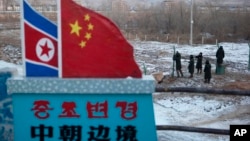The road to successfully blunting North Korea's military adventurism and potentially forcing the rogue nation to give up its nuclear weapons program runs through Beijing, a panel of experts told a U.S. congressional hearing Wednesday.
U.S. lawmakers agreed, with Representative Alan Lowenthal pointing to "real concern in China" about the instability of North Korean leader Kim Jong Un's regime.
Committee Chairman Matt Salmon called China "the 800-pound gorilla for North Korea," supplying 80 percent of the North's food and energy and the majority of its foreign direct investment.
"It is essential to get China to comply with existing sanctions [against North Korea] already on the books," said Bruce Klingner of the Heritage Foundation, a Washington-based think tank.
The U.S. House of Representatives voted nearly unanimously on Tuesday to pass legislation to broaden sanctions on the North.
On Wednesday, South Korea warned Pyongyang the new measures by the United States and its allies could inflict "bone-numbing pain" after its latest nuclear test, and also called for China to do its part to rein in its isolated neighbor.
While members of the Chinese military, business and political elite see North Korea differently, the one that matters may be at the top, said Bonnie Glaser of the Center for Strategic and International Studies in Washington.
"[Chinese President and Communist party chief] Xi Jinping is a decisive, bold leader who could overrule opposition within the Chinese military and party to change the relationship with North Korea," Glaser said.
But the panelists also expressed concern at why U.S. President Barack Obama has not hit North Korea harder.
"At the rate we're going, this issue is just going to get punted to the next administration and its going to be an exponentially worse problem," said Victor Cha, Korea chair at the Center for Strategic and International Studies.
The panelists agreed that neither sanctions nor dialog alone would work, but that each must be part of a comprehensive, integrated strategy - similar to the tactics that successfully persuaded Iran to negotiate limits to its nuclear program.
That will likely be harder with North Korea than with Iran, Salmon said, referencing the need to wean trading partners of those nations away from lucrative income streams or political influence.
"With Iran’s trading partners, the United States had to persuade them to go along with secondary sanctions that would affect their bottom line and they agreed," Salmon said.
"With North Korea, we [may have to] anger China, but we should not have any sacred cows on this issue."
Klingner testified that numerous North Korean individuals and entities are potentially vulnerable to sanctions.
He named Iran, Zimbabwe and Burma as countries that have been much more heavily sanctioned than the North.
"The North's recent nuclear test calls for tough action, but we’ve been here before. There are numerous myths about sanctions: that they can’t affect an isolated country like North Korea - that's not true," Klingner said.





